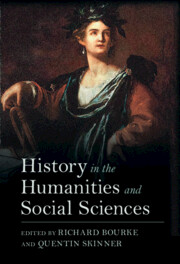Book contents
- History in the Humanities and Social Sciences
- History in the Humanities and Social Sciences
- Copyright page
- Contents
- Figures
- Contributors
- Acknowledgements
- Introduction
- 1 Law and History, History and Law
- 2 History, Law and the Rediscovery of Social Theory
- 3 The Uses of History in the Study of International Politics
- 4 International Relations Theory and Modern International Order: The Case of Refugees
- 5 The Delphi Syndrome: Using History in the Social Sciences
- 6 Power in Narrative and Narratives of Power in Historical Sociology
- 7 History and Normativity in Political Theory: The Case of Rawls
- 8 Political Philosophy and the Uses of History
- 9 The Relationship between Philosophy and its History
- 10 When Reason Does Not See You: Feminism at the Intersection of History and Philosophy
- 11 On (Lost and Found) Analytical History in Political Science
- 12 Making History: Poetry and Prosopopoeia
- 13 Reloading the British Romantic Canon: The Historical Editing of Literary Texts
- 14 Economics and History: Analysing Serfdom
- 15 The Return of Depression Economics: Paul Krugman and the Twenty-First-Century Crisis of American Democracy
- 16 Anthropology and the Turn to History
- Index
- References
5 - The Delphi Syndrome: Using History in the Social Sciences
Published online by Cambridge University Press: 08 December 2022
- History in the Humanities and Social Sciences
- History in the Humanities and Social Sciences
- Copyright page
- Contents
- Figures
- Contributors
- Acknowledgements
- Introduction
- 1 Law and History, History and Law
- 2 History, Law and the Rediscovery of Social Theory
- 3 The Uses of History in the Study of International Politics
- 4 International Relations Theory and Modern International Order: The Case of Refugees
- 5 The Delphi Syndrome: Using History in the Social Sciences
- 6 Power in Narrative and Narratives of Power in Historical Sociology
- 7 History and Normativity in Political Theory: The Case of Rawls
- 8 Political Philosophy and the Uses of History
- 9 The Relationship between Philosophy and its History
- 10 When Reason Does Not See You: Feminism at the Intersection of History and Philosophy
- 11 On (Lost and Found) Analytical History in Political Science
- 12 Making History: Poetry and Prosopopoeia
- 13 Reloading the British Romantic Canon: The Historical Editing of Literary Texts
- 14 Economics and History: Analysing Serfdom
- 15 The Return of Depression Economics: Paul Krugman and the Twenty-First-Century Crisis of American Democracy
- 16 Anthropology and the Turn to History
- Index
- References
Summary
We discuss how three social science disciplines, economics, sociology, and political science approach history and we contrast them to history as practiced by historians. We find that the drive to identify broadly generalizable causal effects, driven by the desire to predict and shape the future (the “Delphi syndrome”), frequently prompts social scientists to use history in a way that neglects the historians’ valuable insights. At the same time, the recent methodological developments in econometric techniques that have spread through the three disciplines place enormous, often unrealistic, historical demands on social scientists. We illustrate these issues by discussing several examples and we conclude by arguing that a way ahead consists in approaching the relation between idiographic and nomothetic research principles as one that approximates a continuum rather than a dichotomy.
Keywords
- Type
- Chapter
- Information
- History in the Humanities and Social Sciences , pp. 116 - 140Publisher: Cambridge University PressPrint publication year: 2022
References
- 1
- Cited by

